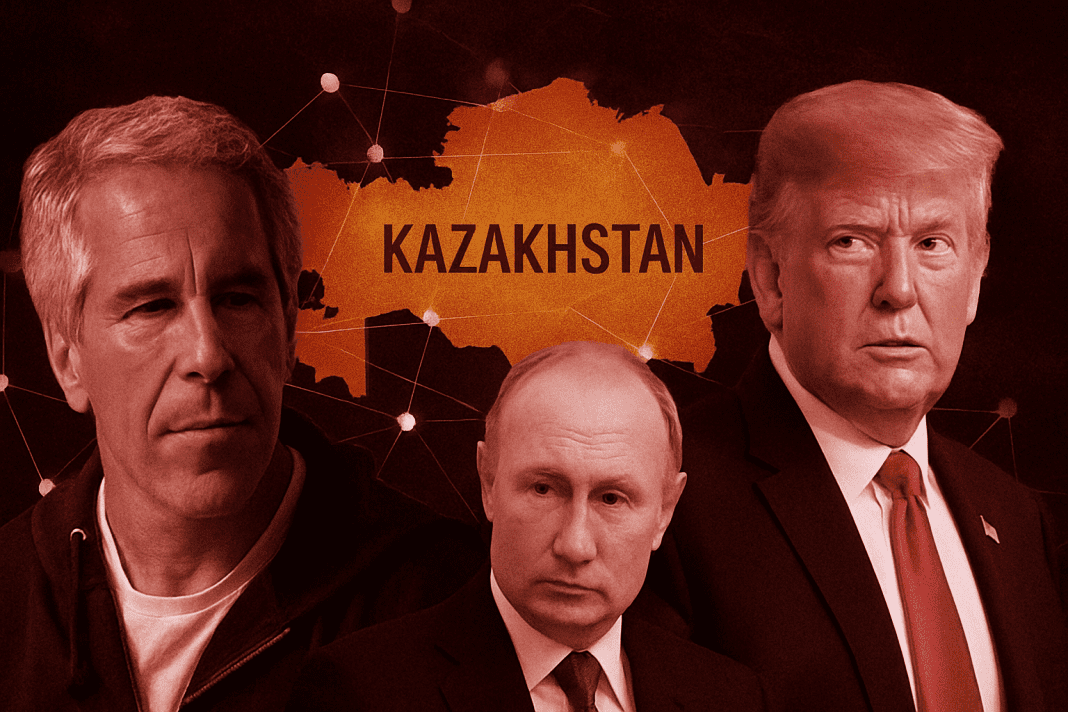A former top intelligence official has made a startling claim about the relationship between Russia’s president and a former U.S. leader.
Explosive Claim — Putin Holds Sensitive Files on Trump
Alnur Mussayev, once the head of Kazakhstan’s State Security Service, has alleged that Russian authorities have in their possession compromising material related to Donald Trump. According to Mussayev, these materials are kept by the Russian Federal Security Service (FSB), which is the successor to the KGB.
Mussayev’s statement suggests that the material is not just political in nature but also covers financial and personal matters. He claims the files include documents, testimonies, and even videos that could cause severe damage to Trump’s reputation if made public. The allegations were made just days before Trump and Russian President Vladimir Putin are scheduled to meet in Alaska for talks about the war in Ukraine.
Financial Records, Personal Allegations, and FSB Storage
According to Mussayev, the alleged files are “extensive and well-documented.” They reportedly contain details of Trump’s financial transactions, including bank accounts and money transfers tied to Russia, Kazakhstan, and other former Soviet republics. Mussayev claims that these financial records are supported by official documents that directly link Trump’s name to the accounts.
Trump draws red line — refuses to discuss Ukraine territory in Putin ceasefire talks
The former intelligence chief also says the files hold testimonies and videos involving violence against women and underage girls. He links some of this alleged activity to locations such as Epstein’s island and Trump’s Mar-a-Lago resort in Florida. Mussayev states that all of these records are in the hands of the FSB, who could use them to pressure Trump into supporting Russian political interests.
These allegations extend beyond financial and personal matters. Mussayev claims that there are broader geopolitical concerns. He suggests that the Kremlin could influence Trump to push policies that might weaken NATO and the European Union. He further alleges that the FSB uses “controlled leaks” — carefully timed releases of information — to keep pressure on Trump and ensure cooperation with Moscow’s goals.
The Kazakhstan–Epstein Connection and Alleged Russian Intelligence Links
The story of Jeffrey Epstein’s private island is already filled with disturbing allegations and global intrigue, but claims by former Kazakh intelligence chief Alnur Mussayev suggest an even more complex layer — one that stretches from the Caribbean to Central Asia and into the heart of Russian intelligence.
According to Mussayev, a group of wealthy businessmen from Kazakhstan were directly involved in providing young women for Epstein’s notorious island. He also claims the same network supplied women for exclusive gatherings at Donald Trump’s Mar-a-Lago resort in Florida. These events, often attended by political and business elites, were typically closed to the public and highly selective in their guest lists.
One figure Mussayev names is Tofik Arifov, a Kazakh-born businessman who has faced legal scrutiny in the past. Mussayev alleges that Arifov was involved in such activities during the 1990s and early 2000s. He further claims that a criminal case against Arifov in the 1990s was dismissed after intervention by the Russian Federal Security Service (FSB). This, Mussayev says, shows that the network was not simply a private business operation — it was under the protection, and possibly the guidance, of Russian intelligence.
Mussayev states that at least three other wealthy Kazakh figures took part in similar operations. He insists these activities were coordinated in a way that served broader Russian objectives. This included cultivating relationships with influential Western figures, hosting them in environments where sensitive or compromising material could be gathered, and ultimately using such leverage to influence decisions.
🧨 Nuclear Shockwave: Kazakhstan Picks Rosatom Russia; CNCC China to Power Atomic Dreams
From an intelligence perspective, such a network would have immense strategic value. By controlling the supply chain for exclusive, high-profile events and ensuring the participation of influential guests, Russian operatives could collect personal information, monitor conversations, and even document compromising situations. Mussayev alleges that this was exactly the kind of operation the FSB managed through its Kazakh connections.
The Kazakh businessmen’s role, in this telling, was to act as trusted intermediaries — people with wealth, access, and a degree of separation from Russian state structures. They could arrange travel, handle logistics, and discreetly invite guests without drawing attention to Moscow’s involvement. The FSB, meanwhile, could quietly oversee the process, store any gathered intelligence, and deploy it strategically when necessary.
The potential geopolitical implications are significant. If Mussayev’s claims are accurate, this network was more than a scandal involving private individuals — it was a targeted intelligence effort. Such operations could be used to influence policy decisions, gain inside information on negotiations, or weaken alliances by creating distrust among leaders.
While these allegations remain untested in court, their implications extend beyond personal misconduct. They suggest that the Kazakhstan–Epstein link may have been part of a broader Russian intelligence playbook — one that blended social access, political networking, and covert leverage into a single, long-running operation.
As the upcoming Alaska meeting approaches, observers note that the location itself carries symbolic weight. Alaska was once Russian territory before being sold to the United States in the 19th century. The choice of venue has sparked commentary about whether it sends a message regarding borders and political influence
